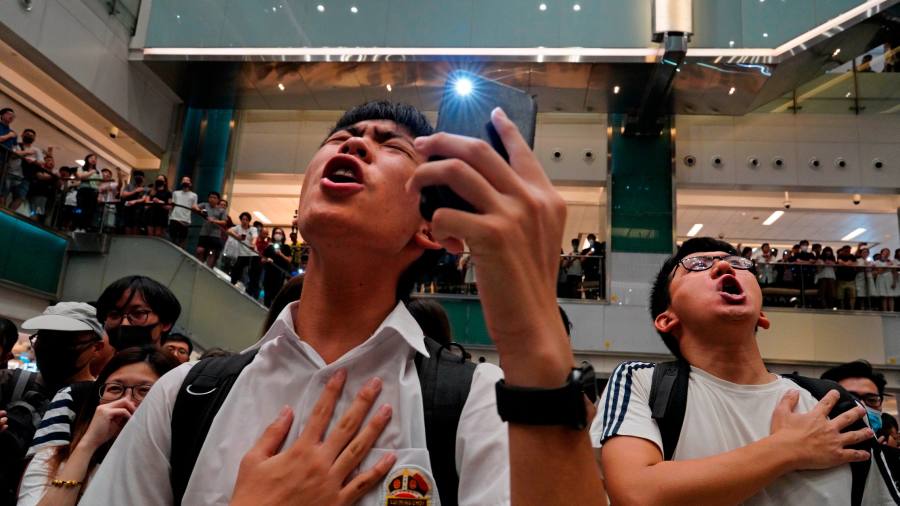Hongkongers are rushing to download a popular protest anthem after the Chinese territory’s government filed for a court injunction that could compel US technology giants such as Google and Meta to block access to it.
“Glory to Hong Kong”, which was written in 2019 and quickly taken up by the citywide pro-democracy protest movement, topped the local iTunes chart for two days this week despite pro-Beijing politicians warning residents to delete it from their devices.
The government’s filing on Monday cited 32 YouTube videos, which could now be blocked and deemed “seditious”.
The song, which has also been uploaded to Facebook, Instagram and Twitter, has been repeatedly played in error at international sporting events instead of “March of the Volunteers”, the Chinese national anthem, drawing condemnation from Hong Kong’s government.
Beijing responded to the 2019 demonstrations with a sweeping crackdown on dissent in the city, imposing a national security law in 2020 that threatens up to life imprisonment for broadly defined crimes such as “subversion” and “collusion with foreign forces”.
Activists have fled or been jailed, school curricula have been overhauled for patriotic content, public libraries have culled sensitive titles from their stacks and independent media outlets have been forced to cease operations.
“I want to keep a record,” said a local resident in her 20s who downloaded the song on Wednesday following news of the government’s court request. “I’m more concerned if the big companies would kowtow to this.”
As Hong Kong seeks to revive its status as a global financial hub, the government’s filing has revived growing liability concerns for foreign tech companies operating in the territory.
“Tech companies like Google and Meta don’t have too many options in hand to deal with a court injunction,” said George Chen, Meta’s former head of public policy for greater China and now managing director for Hong Kong and Taiwan at the Asia Group think-tank in Washington.
“They can fully comply, or partially comply with, or ignore,” Chen added. “Partial compliance usually means you block something only for local users”, which is known as “geo-blocking”.
YouTube parent company Google and Facebook parent Meta declined a request for comment. Apple and Twitter did not respond to a request for comment.
Hong Kong’s high court will hold a hearing on the government’s request on Monday.
The city’s leader John Lee has for months exhorted Google to alter its search results to rank the Chinese national anthem above “Glory to Hong Kong”. Google has refused to do so.
Under the injunction application filed this week, the song’s “melody or lyrics or in combination” would be banned to avoid “inciting others to commit secession”.
The song’s composer, who goes by the initial T, told the Financial Times in 2019 that it was written to “spiritually . . . solidify their [protesters’] will”.
Among its lyrics is the line: “Break now the dawn, liberate our Hong Kong. In common breath: Revolution of our times!”, a protest slogan that has been deemed illegal by Hong Kong’s government.
“Ideas, they’re bulletproof,” T said.
Even whistling the tune could have legal repercussions if the injunction is granted, according to barrister Ken KC Lee. “It will be a sweeping move,” he said.
Last year, a harmonica player was arrested after playing “Glory to Hong Kong” outside the British consulate at a vigil mourning the death of Queen Elizabeth II.
Chen, the former Meta executive, raised the prospect of US tech giants’ local offices and staff facing legal repercussions. “It’s no longer ‘business as usual’ for tech companies in Hong Kong,” he said.
Read the full article here




